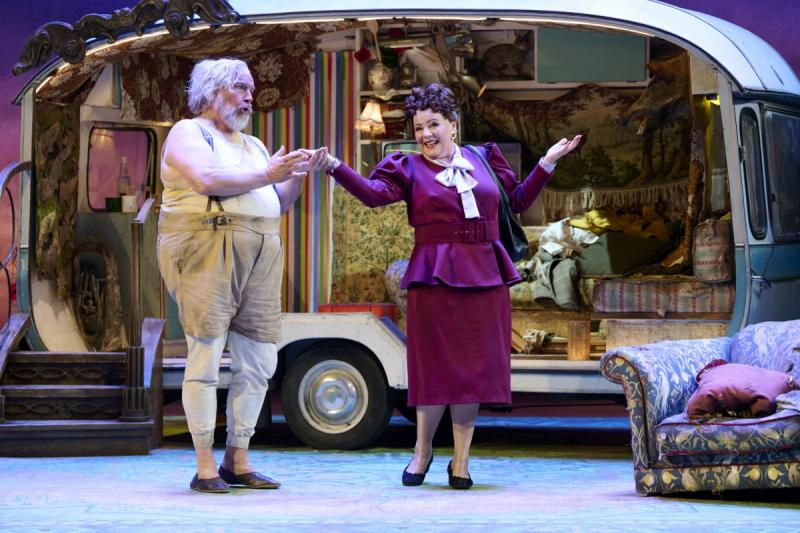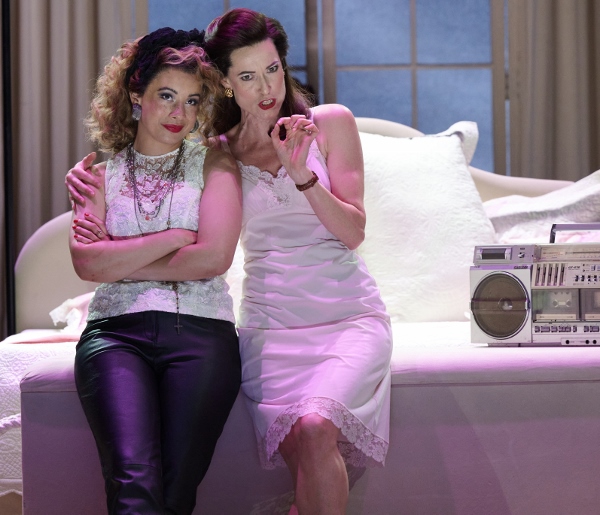Falstaff, Opera North review - going green and having fun | reviews, news & interviews
Falstaff, Opera North review - going green and having fun
Falstaff, Opera North review - going green and having fun
Verdi’s comic masterpiece with a retro feel of its own

There’s a charmingly retro feel to Opera North’s new Falstaff, which comes from it being done as part of their new “green”, i.e. ecologically conscious, season.
Leslie Travers’ set is made of bits from other productions and – most notably – shows Falstaff’s home as a worn-out little 1970s caravan, actually found unwanted in the grounds of a pub on the north side of Leeds by resourceful operatic bargain hunters.
In Olivia Fuchs’ production of Verdi’s final masterpiece, the story’s been transported to the 1980s, and the bourgeoisie of Windsor, who make up most of the roles in the story, are first witnessed meeting at their local tennis club.
She says this shows they’re aspirational but living unsustainably, while Falstaff, in near-squalor, is existing on his wits and having fun – a sort of ageing hippy, I suppose. That’s as may be: he does get through an awful lot of booze and food, as Shakespeare undeniably made him.
There’s something more to it than that, however. It’s quite unusual these days to see an opera production in which the scenes are separated by pauses, with a front curtain falling and a brief opportunity for the audience to cough and chat. We’ve been so used to single-set productions with fast transitions, we’ve almost forgotten how it used to be when re-sets had to be done by moving things off and on, unseen. It’s no doubt part of the philosophy of using found objects and stuff from previous shows, and it’s all silent and very efficient, but it reminds you of a more relaxed era in the theatre.
So does the way Fuchs has staged several of the comic scenes as they might have been in TV productions of an earlier, more innocent, era, with lots of dashing about and people bumping into each other – even a couple of comic policemen – the good-natured anarchy matching the Falstaffian view of life. “Life is a burst of laughter”, as the final choral fugue summarises the story (and the orchestral music so frequently tells us from the very beginning).  It is a remarkable score: Verdi, in his late seventies, writing a comedy opera that’s really like no other, its wonderfully lean and spare textures alive with rhythmic energy and instrumental colour. It’s conducted with superlative skill by Opera North music director Garry Walker, fulfilling his observation of its “almost soufflé-esque lightness” with delicacy and poise, and some highly spirited tempi. Keeping everything together, voices and orchestra, in that manner is both difficult and immensely rewarding, but he and they did it with barely a moment’s falter.
It is a remarkable score: Verdi, in his late seventies, writing a comedy opera that’s really like no other, its wonderfully lean and spare textures alive with rhythmic energy and instrumental colour. It’s conducted with superlative skill by Opera North music director Garry Walker, fulfilling his observation of its “almost soufflé-esque lightness” with delicacy and poise, and some highly spirited tempi. Keeping everything together, voices and orchestra, in that manner is both difficult and immensely rewarding, but he and they did it with barely a moment’s falter.
Casting is enviably apt, with Opera North’s own family feeling well to the fore. Henry Waddington has done some great character roles for them in the past – Don Magnifico, Dr Bartolo, Baron Ochs and Bottom among them – but here he’s created a Falstaff to rival that of Andrew Shore, who played the role so brilliantly in the company’s 1997 production. He’s light on his feet and quick in his mind, and despite his comeuppance in the last scene you wonder who is really laughing at whom by the end.
Louise Winter has Mistress Quickly as a bustling but equally mischievous female, while Kate Royal (Alice Ford) and Helen Évora (Meg Page), the Merry Wives themselves, enjoy themselves getting into the knowingly exaggerated comic business of their near-seduction of the fat knight. Richard Burkhard is ideal for the pompous paterfamilias Ford, and Paul Nilon likewise for the hopeless would-be suitor Dr Caius. Colin Judson and Dean Robinson are the wide-boys (in this vision), Bardolph and Pistol.
(One little puzzle is that I couldn’t see any evidence of Bardolph’s Rudolph-like nose, though the text in Amanda Holden’s English translation of the Boito original – also projected on side-screens, the better for us to appreciate the jokes – keeps referring to it).
Fenton (Egor Zhuravskii) and Nannetta (Isabelle Peters) fill the roles of young lovers with innocent charm, and of course Nanetta has more than a key role in the conspiratorial female quartet of the early part of the opera.
The vocal qualities of all these are admirable, but there is a need for something extraspecial in Verdi’s writing for Alice Ford and Nanetta, and that’s where Kate Royal and Isabelle Peters (pictured above) brought richness of tone and glorious technical ability to bear. The former has a reputation that few could equal and fulfilled it entirely as her track record promised: the latter, a relatively recent product of the Royal Northern College of Music, who first shone to my knowledge as Rapunzel in the Royal Exchange Theatre’s Into the Woods in Manchester while still a student and was outstanding in Errollyn Wallen’s Dido’s Ghost at Buxton Festival two years ago, is a young singer with pure and wonderfully held high notes. Now that’s sustainability.
rating
Explore topics
Share this article
The future of Arts Journalism
You can stop theartsdesk.com closing!
We urgently need financing to survive. Our fundraising drive has thus far raised £49,000 but we need to reach £100,000 or we will be forced to close. Please contribute here: https://gofund.me/c3f6033d
And if you can forward this information to anyone who might assist, we’d be grateful.

Subscribe to theartsdesk.com
Thank you for continuing to read our work on theartsdesk.com. For unlimited access to every article in its entirety, including our archive of more than 15,000 pieces, we're asking for £5 per month or £40 per year. We feel it's a very good deal, and hope you do too.
To take a subscription now simply click here.
And if you're looking for that extra gift for a friend or family member, why not treat them to a theartsdesk.com gift subscription?
more Opera
 Albert Herring, English National Opera review - a great comedy with depths fully realised
Britten’s delight was never made for the Coliseum, but it works on its first outing there
Albert Herring, English National Opera review - a great comedy with depths fully realised
Britten’s delight was never made for the Coliseum, but it works on its first outing there
 Carmen, English National Opera review - not quite dangerous
Hopes for Niamh O’Sullivan only partly fulfilled, though much good singing throughout
Carmen, English National Opera review - not quite dangerous
Hopes for Niamh O’Sullivan only partly fulfilled, though much good singing throughout
 Giustino, Linbury Theatre review - a stylish account of a slight opera
Gods, mortals and monsters do battle in Handel's charming drama
Giustino, Linbury Theatre review - a stylish account of a slight opera
Gods, mortals and monsters do battle in Handel's charming drama
 Susanna, Opera North review - hybrid staging of a Handel oratorio
Dance and signing complement outstanding singing in a story of virtue rewarded
Susanna, Opera North review - hybrid staging of a Handel oratorio
Dance and signing complement outstanding singing in a story of virtue rewarded
 Ariodante, Opéra Garnier, Paris review - a blast of Baroque beauty
A near-perfect night at the opera
Ariodante, Opéra Garnier, Paris review - a blast of Baroque beauty
A near-perfect night at the opera
 Cinderella/La Cenerentola, English National Opera review - the truth behind the tinsel
Appealing performances cut through hyperactive stagecraft
Cinderella/La Cenerentola, English National Opera review - the truth behind the tinsel
Appealing performances cut through hyperactive stagecraft
 Tosca, Royal Opera review - Ailyn Pérez steps in as the most vivid of divas
Jakub Hrůša’s multicoloured Puccini last night found a soprano to match
Tosca, Royal Opera review - Ailyn Pérez steps in as the most vivid of divas
Jakub Hrůša’s multicoloured Puccini last night found a soprano to match
 Tosca, Welsh National Opera review - a great company reduced to brilliance
The old warhorse made special by the basics
Tosca, Welsh National Opera review - a great company reduced to brilliance
The old warhorse made special by the basics
 BBC Proms: The Marriage of Figaro, Glyndebourne Festival review - merriment and menace
Strong Proms transfer for a robust and affecting show
BBC Proms: The Marriage of Figaro, Glyndebourne Festival review - merriment and menace
Strong Proms transfer for a robust and affecting show
 BBC Proms: Suor Angelica, LSO, Pappano review - earthly passion, heavenly grief
A Sister to remember blesses Puccini's convent tragedy
BBC Proms: Suor Angelica, LSO, Pappano review - earthly passion, heavenly grief
A Sister to remember blesses Puccini's convent tragedy
 Orpheus and Eurydice, Opera Queensland/SCO, Edinburgh International Festival 2025 review - dazzling, but distracting
Eye-popping acrobatics don’t always assist in Gluck’s quest for operatic truth
Orpheus and Eurydice, Opera Queensland/SCO, Edinburgh International Festival 2025 review - dazzling, but distracting
Eye-popping acrobatics don’t always assist in Gluck’s quest for operatic truth
 MARS, Irish National Opera review - silly space oddity with fun stretches
Cast, orchestra and production give Jennifer Walshe’s bold collage their all
MARS, Irish National Opera review - silly space oddity with fun stretches
Cast, orchestra and production give Jennifer Walshe’s bold collage their all

Add comment